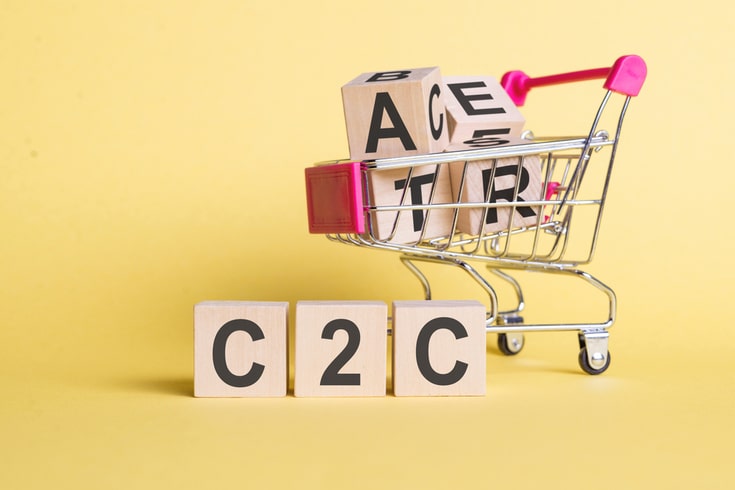Legal Responsibilities of Platform Operators in User-to-User Transactions

As the role of the internet continues to grow, e-commerce on the internet has expanded its scale as a BtoC (Business to Consumer) transaction market. On the other hand, CtoC (Consumer to Consumer) transactions between individuals, mainly through internet auctions provided by businesses, are also developing.
Furthermore, with the recent spread of smartphones, not only internet auctions where the price of the item is determined by bidding, but also CtoC transactions between users through flea market apps, where the seller sets the price and the buyer decides whether to purchase at that price, have become increasingly active.
In user-to-user transactions, the system that mediates transactions provided by the platform operator plays an extremely important role in its development, making the platform operator an indispensable presence.
Here, we will discuss the issue of whether the platform operator is liable to users who claim to have suffered damage in services where user-to-user transactions take place.
Legal Relationship between Platform Operators and Users
Platform operators often stipulate in their terms of use that they do not get involved in any way with the establishment or content of transactions between users. However, how do these limitations of liability in the terms of use actually function?
Terms of Use
The legal relationship between platform operators and users is primarily governed by the terms of use.
For example, when registering online as a user, the terms of use become a contract between the platform operator and the user by clicking to agree to the terms of use. Users may also be required to click to agree to the terms of use each time they perform individual transaction actions (such as listing items, bidding/winning bids, purchase applications, etc.).
Once such a contract is concluded, the legal relationship between the user and the platform operator is primarily governed by the terms of use. The terms of use typically specify when the platform operator is and is not liable.
It is important to note that the contract between the platform operator and the user is a contract concluded between a consumer and a business operator, so the Japanese Consumer Contract Act applies.
When the Japanese Consumer Contract Act applies, clauses that exempt the platform operator from all liability for damages caused to consumers by their own non-performance of obligations (Article 8, Paragraph 1, Item 1 of the Japanese Consumer Contract Act) or clauses that exempt part of the liability for damages caused to consumers by the non-performance of obligations by the platform operator (limited to those caused by the intentional or gross negligence of the operator, its representative, or its employee) (the same paragraph, Item 2), or clauses that grant the operator the authority to determine the existence or limit of such liabilities, will be invalid even if they are in the terms of use.
The following clauses in a consumer contract are invalid:
1. Clauses that exempt the business operator from all liability for damages caused to consumers by non-performance of obligations, or grant the operator the authority to determine the existence of such liability
2. Clauses that exempt part of the liability for damages caused to consumers by non-performance of obligations by the business operator (limited to those caused by the intentional or gross negligence of the operator, its representative, or its employee), or grant the operator the authority to determine the limit of such liability
Article 8 of the Japanese Consumer Contract Act (Invalidity of Clauses Exempting Business Operators from Liability for Damages)
It’s not enough to just prepare terms of use, and getting users to agree to the terms of use does not mean that all liability is exempted.

Responsibility of Platform Operators
In terms of user agreements, it is common for platform operators to stipulate that they are not involved in any way with contracts of sale between users, and therefore bear no responsibility. Therefore, if a platform operator does not substantially involve itself in transactions, it is not, in principle, responsible to the users. However, it is recognized that there may be room to acknowledge a certain duty of care associated with providing the ‘venue’ or system for transactions.
Moreover, if a platform operator does substantially involve itself in transactions, it may bear responsibility according to its role, and clauses that completely exempt the operator from responsibility for transactional activities may be invalidated under Article 8 of the Japanese Consumer Contract Act.
When Platform Operators Do Not Substantially Involve Themselves in Transactions
There can be various types of transactions between users. Among these, in services where the platform operator only provides a system for mediating transactions such as sales between individuals and does not substantially involve itself in individual transactions, it is generally considered that transactions are conducted at each user’s own risk, and the platform operator is not held responsible.
In this case, the platform operator plays a role in mediating transactions by providing a system, but it is not a party to the actual transaction. In such cases, the platform operator is merely a provider of the venue or system for transactions and does not substantially involve itself in the conclusion of individual transactions. Therefore, it is generally understood that the operator is not responsible for troubles arising from transactions between users.
However, since the platform operator provides an infrastructure system through which information related to transactions between users is mediated, there may be room for responsibility in certain cases. In other words, it can be said that the platform operator may be required to exercise a certain duty of care, as it provides the ‘venue’ for transactions based on contracts with users.
For example, in an Internet auction, if the platform operator does not stop the auction of a listed item despite receiving an order to stop the auction from the chief of the police department (under Article 21-7 of the Japanese Secondhand Articles Dealer Act), and the successful bidder purchases stolen goods and receives a return request from the owner of the stolen goods, the platform operator may be liable for damages due to a breach of duty of care to the successful bidder.

When Platform Operators Substantially Involve Themselves in Transactions
In the type where the platform operator merely provides a system for mediating transactions between users and does not substantially involve itself in individual transactions, it is not, in principle, held responsible for troubles arising from individual transactions. However, in reality, service operators may play roles beyond mere system providers in various situations.
The ‘Guidelines on E-commerce and Information Property Trading’ by the Ministry of Economy, Trade and Industry of Japan list the following three cases as instances where platform operators substantially involve themselves in transactions:
First, there are cases where the platform operator actively assists users in listing items and receives listing fees or auction rewards from the listers.
For example, consider a case where, in an Internet auction or flea market service, the platform operator receives applications by phone from users, receives the brand-name items they wish to list, acts on behalf of the users in listing the items, and receives fees for listing and rewards for successful auctions. In this case, the platform operator is an agent for listing, not just a provider of a venue. This is because the platform operator, having the listed items in hand, is in a position to check whether they are counterfeit brand-name items, and has acted on behalf of the lister in listing them. Therefore, regardless of the provisions of the terms of use, the operator may be held responsible to the buyer if trouble arises. In such cases, if the item listed at the request of the operator is a ‘secondhand article’, the platform operator may be subject to regulations under the Japanese Secondhand Articles Dealer Act.
When the platform operator recommends a specific seller in some way, it is also considered to be substantially involved.
For example, if the platform operator recommends a specific user, promotes the sales activities of a specific user, or recommends a specific listed item, depending on the manner of recommendation or promotion, the platform operator may be held responsible for troubles arising from transactions between users. For instance, if the operator goes beyond merely collecting a certain fee for advertising on its website and actively introduces a specific seller by setting up a special page for the seller, posting interviews, and designating certain listed items of the seller as ‘bargains’ or ‘highly recommended cheap items’, the platform operator may also be held responsible if a sales trouble occurs.
Also, when the platform operator itself becomes a party to a transaction, such as a seller, it is considered to be substantially involved.
For example, in a user-to-user transaction platform, the platform operator may be displayed as a party to the transaction, such as a seller, on the system, but the actual sales proceeds (calculation) may immediately belong to the listing user. In such cases, the platform operator is, in principle, responsible as a party to the transaction, such as a seller.

Summary: Platform Operators Can Be Responsible for User-to-User Transaction in Some Cases Even With the Consent of Terms of Use
Even if you have prepared terms of use and obtained the user’s consent in the terms of use, it does not mean that the platform operator will not be held responsible at all for transactions between users.
Furthermore, it is understood that a contractual relationship is established between the platform operator and the user regarding the use of the transaction brokerage system provided by the platform operator. Therefore, not only troubles related to transactions between users, but also obligations related to the maintenance and management of the system, for example, can be problematic.
This applies not only to internet auctions, but also to flea market services.
Introduction to Our Firm’s Measures
Monolith Law Firm is a legal office with high expertise in both IT, particularly the internet, and law. In recent years, the necessity for legal checks has been increasing due to the growing trend of transactions through online platforms. Our firm provides solutions related to intellectual property.
Category: IT
Tag: ITTerms of Use





















